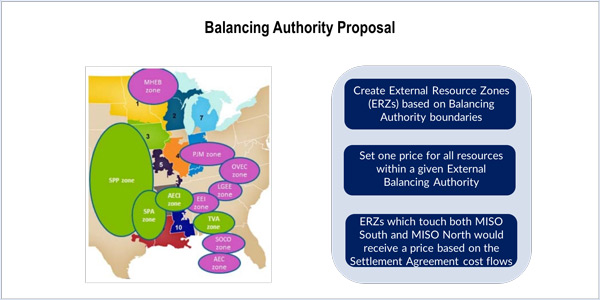By Amanda Durish Cook
MISO last week presented stakeholders with a proposal to tighten rules on capacity imports amid uncertainty over whether a recent appellate court ruling will impact FERC’s ability to approve the changes.
In early July, the D.C. Circuit Court of Appeals eliminated portions of PJM’s minimum offer price rule that have been in place since 2013, ruling that FERC overstepped its authority when it suggested changes to a PJM proposal that resulted from a compromise among stakeholders. The court said although FERC can make minor changes to Tariff filings, it cannot substitute its own plan and must approve or reject an RTO proposal as is. (See PJM MOPR Order Reversed; FERC Overstepped, Court Says.)
MISO’s proposal — which would integrate external resources zones into the Planning Resource Auction using a single clearing price for each external balancing authority — has been met with a mixed stakeholder response. As a result, some stakeholders think the RTO should hit pause on a proposed September FERC filing and continue working for a proposal that has broad support.
FERC’s Power Diminished?
MISO Assistant General Counsel Michael Kessler said that the appellate ruling means FERC’s power may be diminished when it regains its quorum. (See related story, Trump Names Energy Lawyer McIntyre as FERC Chair.)
“It’s sort of a new package of standards. As it stands now, it’s a definite limitation on the commission’s authority to accept changes on a Section 205 filing,” Kessler said during a July 12 Resource Adequacy Subcommittee meeting.
Kessler said there is some ambiguity in the ruling on the distinction between significant changes that FERC is prohibited from suggesting and minor changes the commission can order.
“This isn’t just a PJM, MISO issue; it’s an industry issue. Any filing party will have to consider what FERC can and can’t do now since the back-and-forth that we’ve gotten used to [since the 1990s]. That route is not going to be available anymore. The whole industry will be carefully reviewing this to see the implications on filings going forward,” Kessler said. He added that all pending appeals of FERC-ordered changes could be up for reinterpretation.
Stakeholders said that with FERC expressly prohibited from ordering changes to RTO proposals, chances of the commission approving the contentious locational proposal may be smaller.
Customized Energy Solutions’ David Sapper, representing MISO’s Load-Serving Entity Coalition, said the ruling may signal to MISO that it’s time to only pursue filings with majority stakeholder support.
Last month, Sapper and the coalition made a motion to delay the locational proposal in favor of a capacity transfer rights proposal that would treat long-term supply arrangements involving external resources the same as internal planning resources. (See Changing Course, MISO Adopts IMM External Resource Zone Plan.) Stakeholders later passed the motion in an email vote 34-11 with three abstentions.
MISO Executive Director of Strategy Shawn McFarlane reminded stakeholders that the motion is only treated as advice and is not binding. He said the motion signals to the RTO that more discussion with stakeholders is needed.
“So, we think we need some follow-up conversations,” he said. “We’ll be reaching out to stakeholders over the next few weeks. … We think some one-on-ones is going to be appropriate.”
McFarlane added that MISO will be making sure that the stakeholders that voted in favor of the motion understand the locational proposal; he said it would look for some possible modifications as well.
Asked if FERC would reject the filing without consensus among MISO and its stakeholders, McFarlane said it was too early for speculation and that the RTO still has time to alter its proposal.
Combined Filing Likely
Indianapolis Power and Light’s Ted Leffler asked if MISO has considered filing the locational proposal separately from hedging rules so the external location zone filing is not rejected based on its proposed approach on allocating excess auction revenues.
MISO has proposed that auction revenues be first handed to resources with historical commitments, with pre-RTO formation capacity arrangements and pre-locational capacity arrangements given first consideration for funding. External resources with contracts to MISO load affected by the proposal are next in line before the RTO doles out revenues as usual using an existing zonal deliverability benefit assessment.
McFarlane said MISO has considered separate filings but is still leaning toward a combined filing.
Leffler asked how many external capacity resources will become unmarketable because of a low clearing price and the lack of a historic capacity agreement.
“I think it’s important that we understand how much is at risk here,” Leffler said. “The auction clearing prices are very sensitive to changes in supply and demand.”
“We don’t feel like we have a choice but to address the potential reliability issue from our current approach here,” McFarlane said. He added that MISO is eyeing a “reasonable” approach that can win FERC approval.
Some stakeholders are still asking MISO for more details on how external resources are treated based on geographic distance from the RTO’s footprint. They asked that prices be based on a resource’s proximity to loads inside MISO instead of a uniform external balancing authority price.
Laura Rauch, MISO manager of resource adequacy coordination, said that except for resources near a border, the RTO sees no difference in deliverability in resources situated “150 miles away from MISO or 300 miles from MISO.” Its concern is whether a resource in Chicago or New Jersey can deliver against Lower Michigan’s clearing requirement “as well as a Detroit resource,” she said.






